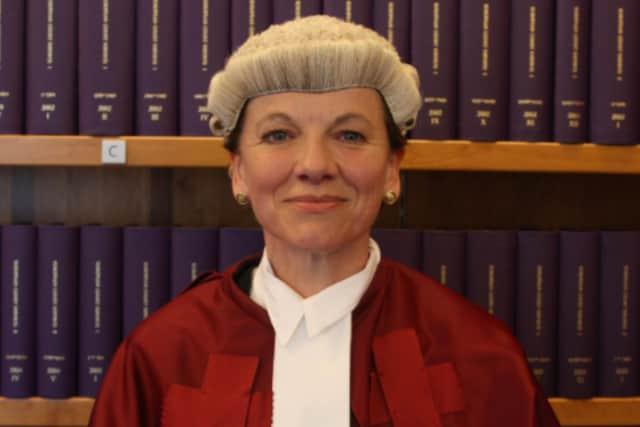Beware this odd ruling in the Scottish courts and the floodgates it could open - John McLellan
As both the chief law officer responsible for investigating and prosecuting crime and the Scottish Government’s principal legal adviser who also represents the Scottish Government in civil proceedings, the lines can become almost impossibly blurred, as they were for Lord Advocate James Wolffe, despite a deserved reputation for utmost probity, during the series of Alex Salmond court hearings in which most witnesses had held significant government positions. Current incumbent Dorothy Bain found herself arguing the Scottish Government’s case for a second independence referendum in the Supreme Court, despite the overwhelming weight of opposing legal opinion.
But it needn’t be party political, as in the case of senior judge Frank Mulholland, who as Lord Advocate led the Crown Office when accountants and lawyers working on the Rangers take-over and subsequent collapse into administration were prosecuted. When the Crown Office later had to admit the failed cases were malicious, resulting in compensation payments now running at over £130m, Lord Mulholland’s proud ownership of a Celtic season ticket was called into question.
Advertisement
Hide AdAdvertisement
Hide AdConspiracy theories seem to come with the territory, with Ms Bain again in the firing line because of the fortnight it took for the Crown Office to approve the warrant to search Nicola Sturgeon’s house, putting the subsequent raid beyond the outcome of the SNP leadership contest in which the winner Humza Yousaf was seen as the Continuity Sturgeon candidate. I have never met Ms Bain, but those who know her say her strength of character is such that notions of political game-playing are well wide of the mark.


Of course, just because the boss’s integrity is unimpeachable doesn’t mean mistakes aren’t made elsewhere in a complex organisation, and while the Rangers case might not have its roots in the Lord Advocate’s office, someone in the system behaved maliciously and the reputation of the prosecution services only partly rescued by the admission. And two weeks does seem a long time to approve a search warrant.
The mark of a good organisation is not the absence of errors, but the speed with which they are rectified, and the principles for judges and prosecutors are simple. “We make our decisions independently and in the public interest,” says the Crown Office and “Judges base their decisions solely on the law and on the facts and evidence of the case in court,” says the Judiciary of Scotland, highlighting the judicial oath all judges must take, swearing to make rulings “without fear or favour, affection or ill-will”. It goes without saying they also need to know the laws in question, and if they are unsure to find out. They might be very clever, but they are human and make mistakes like everyone else.
While it’s easy to put errors just down to one of those things in a process which relies on human judgement, the Rangers case shows the result can be catastrophic. Not obviously catastrophic but arguably dangerous is a recent and relatively low-profile decision by Lady Drummond to ban identification of a murder victim in a case she is trying at the High Court in Glasgow because, according to the court order, of the “impact on the reputation of the deceased.” It was a strange decision, given the Scottish Law Commission (SLC) spent a considerable amount of time investigating the rights of dead people to have their reputations protected and in 2017 concluded it was hard to extend the right to sue for injured feelings to “a person who is no longer alive.” A 2011 Scottish Government paper stated, “It is a long-understood principle of the common law that a deceased person cannot be defamed, because reputation is personal.” The SLC decided extending defamation law to cover the dead was impractical and it was not included in the 2021 Defamation and Malicious Publication Act, so its omission has been accepted by the Scottish Parliament,
The crux of the matter is the arguments are less about the reputation of the dead but all about the feelings of friends and relatives, which is entirely different. In the latest case, Lady Drummond’s ruling makes no mention of relatives, but it’s understood the Crown made the application after being approached by the family of the dead man, who was allegedly raped before being killed, to protect his children from the effects of any publicity.
Readers are entitled to have sympathy with the purpose of the decision, but it has no basis in law and has significant implications for the rights of journalists to report court proceedings fairly and accurately, and if Lady Drummond’s ruling stands it could open the floodgates for anyone involved in criminal proceedings, either victim or accused, to seek anonymity on the basis of embarrassment or upset for close relatives. In effect, it is a privacy ruling without any chance for counter arguments to be put before a court, but as it was a Crown application it is Dorothy Bain’s ultimate responsibility – even though she wouldn’t know much about it until the story appeared in some morning papers. A challenge is being mounted by media organisations, including the BBC, but the bill has already run well into four figures without a hearing, and although it wouldn’t please the relatives it would be wise for Lady Drummond to withdraw an order made in some haste. And it would show that top lawyers, like the rest of us, are only human.